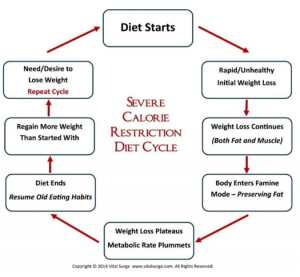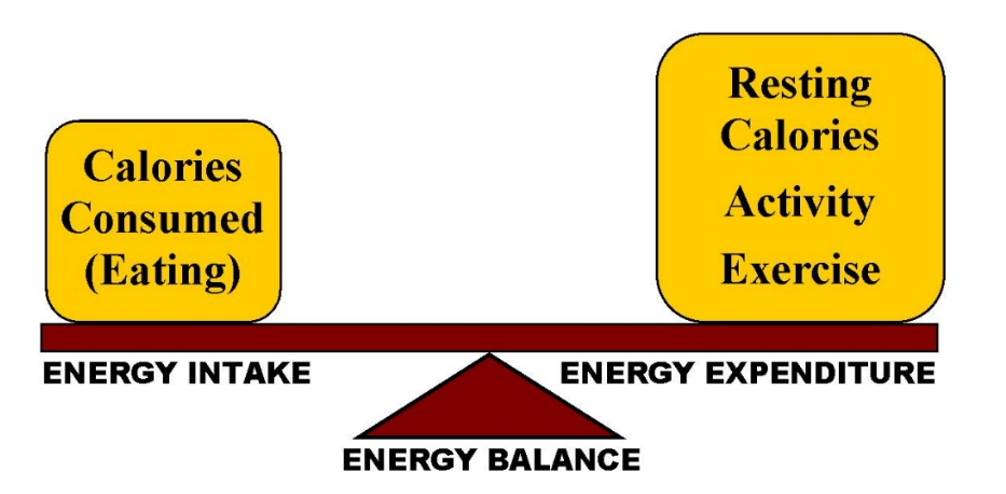Few, if any, human wellness endeavors have been met with as much failure as the attempt to healthfully and efficiently lose body fat long-term. A dieter often begins with the goal of losing weight as rapidly as possible. Severe caloric restriction is usually the method chosen to reach that end. This is a mistake. The goal needs to be fat loss, and adequate time must be allowed for it to happen.
“You can lose weight fast, but you CAN’T lose fat fast.”
This is a universal truth in the weight loss world. Direct, surgical removal is the only fast option. The perpetuation of this myth is not necessarily the fault of the dieter. The weight loss industry selfishly promotes the quick weight loss hoax for-profit and to the detriment of confused, and in some cases desperate people.
The human body is a biological machine with a brain ingeniously designed for survival. When dieting, your body perceives losing weight as a threat. This reaction activates the genetically programmed protections against starvation. When we choose to withhold calories, our bodies panic initiating a phenomenon called “starvation simulation.” Our physiology doesn’t know that there’s a McDonalds down the street. As far as your body knows, you’re huddled in a cave starving.
Starvation simulation was a survival advantage to our ancestors—in the 21st century not so much.
Severe calorie restriction-induced “Starvation simulation” prompts your body to save body fat for survival at the expense of protein. Muscle is protein and is literally consumed and sacrificed to be a fuel source, causing your metabolism to plummet. The metabolic rate is the rate at which your body uses calories at complete rest. Active, dynamic muscle tissue is the key to high metabolism, and a robust metabolic rate is essential to healthy and effective fat loss. Crash dieters lose weight fast, but part of the loss is muscle. The lowered metabolic rate causes fat gain as soon as they resume their old eating habits.
 The “Diet Cycle” flow chart is reprinted from my book, Healthy Dynamic Living: Utilizing Lifestyle Lessons from Your Ancestors to Promote Healthy Aging and Ultimate Wellness page 110. Note that even if “weight loss” is successful the person typically gains weight in excess of where they started when the previous “weight maintenance” diet is resumed. If a new starvation diet ensues, the weight will be lost, the metabolism will be insulted more severely, and the maintenance caloric level will be lowered again.
The “Diet Cycle” flow chart is reprinted from my book, Healthy Dynamic Living: Utilizing Lifestyle Lessons from Your Ancestors to Promote Healthy Aging and Ultimate Wellness page 110. Note that even if “weight loss” is successful the person typically gains weight in excess of where they started when the previous “weight maintenance” diet is resumed. If a new starvation diet ensues, the weight will be lost, the metabolism will be insulted more severely, and the maintenance caloric level will be lowered again.
Dr. Kelly D. Brownell, an obesity expert at Duke University, coined the term yo-yo dieting a.k.a. the “rhythm method” of girth control. Less food resulting in nutrient deficiencies, dehydration, a weakened immune system, and weakened muscles making it harder to engage in exercise and physical activity are additional damaging side effects of severe caloric restriction.
Employ subtle Caloric Restriction if reducing caloric intake to lose weight.
 It’s necessary that your body never perceives itself as starving. Cut calories slightly while consuming a variety of nutrient-dense foods containing adequate amounts of low-glycemic carbohydrates, healthy fats, and clean protein. Also, drink plenty of water. Very low-calorie diets are those that restrict caloric intake to less than 1,200 calories per day. Some diet regimens define very low caloric intake at an unsustainable and dangerous 500 calories per day. During my time consulting I’ve rarely suggested consuming less than 1,200 calories per day if the individual was able to perform some level of physical activity. I’ve seen very low-calorie diets work for losing weight, (mostly muscle loss) and the dieter nearly always suffered health deficits while gaining back more weight than had originally been lost. As illustrated in the flow chart above a crash diet results in a vicious downward cycle of burning muscle for fuel > slowing metabolic rate > causing fat gain > further restricting calories > burning more muscle for fuel, etc.
It’s necessary that your body never perceives itself as starving. Cut calories slightly while consuming a variety of nutrient-dense foods containing adequate amounts of low-glycemic carbohydrates, healthy fats, and clean protein. Also, drink plenty of water. Very low-calorie diets are those that restrict caloric intake to less than 1,200 calories per day. Some diet regimens define very low caloric intake at an unsustainable and dangerous 500 calories per day. During my time consulting I’ve rarely suggested consuming less than 1,200 calories per day if the individual was able to perform some level of physical activity. I’ve seen very low-calorie diets work for losing weight, (mostly muscle loss) and the dieter nearly always suffered health deficits while gaining back more weight than had originally been lost. As illustrated in the flow chart above a crash diet results in a vicious downward cycle of burning muscle for fuel > slowing metabolic rate > causing fat gain > further restricting calories > burning more muscle for fuel, etc.
Successful fat loss is a multifaceted endeavor requiring skillful integration of many nutritional, behavioral, and activity related variables. Severe caloric restriction is just one of many pitfalls that must be considered while starting a weight loss regimen. Seek expert guidance to realize safe, healthy and effective fat loss.
What some people call health, if purchased by perpetual anxiety about diet, isn’t much better than tedious disease. —George Dennison Prentice, Prenticeana, 1860

Wayne Coolidge, Jr., M.Ed., CHES is an author, speaker, and innovative Health Promotion Scholar-Practitioner. He owns Wayne Coolidge Health Promotion, a consulting firm specializing in healthy aging, nutrition, nutritional supplementation, fat loss, fitness, and disease prevention. His expertise is designing lifestyle-optimization strategies leading to positive genetic expression, controlled cellular aging, health, and wellness. He has accumulated more than 31,000 hours of one-on-one training and personal consultation experience over a 36-year career. You can email him at wayne@healthydynamicliving.com.



Excellent information. Thank you!
Pingback: Health Q&A – LKN Connect